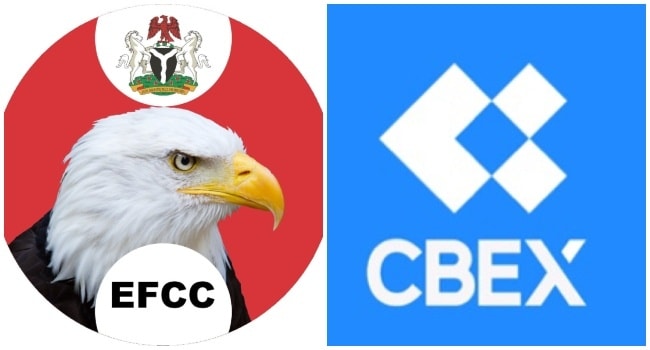CBEX Operators Arraigned Over Alleged $1bn Crypto Investment Scam
EFCC Accuses Defendants of Promising 88% ROI Without Regulatory Approval
The Economic and Financial Crimes Commission (EFCC) on Monday arraigned two alleged promoters of the controversial Crypto Bridge Exchange (CBEX) over accusations of running unlicensed financial operations and promising outrageous investment returns without regulatory consent.
The accused, Avwerosuo Otorudo and Chukwuebuka Ehirim, were arraigned before Justice Mohammed Umar of the Federal High Court, Abuja, on a three-count amended charge marked: FHC/ABJ/CR/216/2025.
According to the EFCC, the defendants collected funds from unsuspecting members of the public, promising returns of up to 88 per cent through an investment platform—CBEX—without approvals from relevant financial regulators, including the Securities and Exchange Commission (SEC).
When the matter was called, prosecution counsel, Fadila Yusuf, told the court that an amended charge had been filed on July 7 and sought to substitute the previous one. “We still rely on all the proof of evidence and other documents filed to prove our case,” she said.
The defence counsel, Justice Otorudo, did not oppose the application, and the amended charge was read to the defendants, who both pleaded not guilty.
Yusuf then urged the court to remand the accused persons in a correctional centre pending the determination of the case. However, defence counsel applied for bail, citing a bail application filed on June 30.
He argued that the accused had no prior criminal records, voluntarily surrendered themselves to the EFCC, and cooperated with investigators since their detention began on April 25.
“Since they did not interrupt the investigation process, it is evidence that they will not jump bail,” he said.
He added that the charges were bailable, and there was no concrete evidence showing the public had deposited funds with the defendants. He also disputed claims published on the EFCC’s website that the accused obtained $1 billion under false pretence, stating: “There is no such charge before this court.”
But the EFCC opposed the application, with Yusuf noting that a counter affidavit had already been filed. She said the amended charges were within legal bounds and warned the court about the risk of the defendants absconding.
“They only submitted after the court forced them to do so. If granted bail, they might not be found again because we have not seen others till date,” she told the court.
The defence then requested that the accused remain in EFCC custody pending the bail ruling, but the EFCC objected, insisting that they are now legally under court custody.
Justice Umar ordered that Otorudo and Ehirim be remanded at the Kuje Correctional Centre and adjourned the case until July 18 for ruling on the bail application.
Details of the Allegations
In count one, the EFCC alleged that between January 2024 and May 2025, the defendants invited members of the public to invest through CBEX, promising returns of up to 88 per cent without SEC approval. The alleged act violates Section 1 of the Investment and Securities Act, 2025, and is punishable under Section 96(5).
In count two, the duo allegedly invited public deposits without being a licensed bank or authorised financial institution, an offence under Section 44(1) of the Banks and Other Financial Institutions Act (BOFIA), 2020, punishable under Section 44(2).
Count three accuses them of operating a financial service—specifically an investment scheme—without a valid license, in violation of Sections 57(1) and (2) of BOFIA, 2020, and punishable under Section 57(5).
Background of the Case
The News Agency of Nigeria (NAN) reports that Justice Emeka Nwite of another Federal High Court had, on April 24, granted an EFCC ex-parte application to arrest and detain six CBEX operators.
The detained suspects include Adefowora Abiodun, Adefowora Oluwanisola, Emmanuel Uko, Seyi Oloyede, Avwerosuo Otorudo, and Chukwuebuka Ehirim.
The EFCC stated that its investigation, led by the Cybercrimes Section, uncovered that the suspects—through ST Technologies International Limited—used CBEX to lure investors into converting digital assets into USDT (a stable coin), with initial access to the platform to monitor their investments.
However, after deposits valued at over $1 billion were made, the platform allegedly became inaccessible, and withdrawals were blocked, leading to suspicions of fraud.
Further investigation revealed that while ST Technologies was registered with the Corporate Affairs Commission (CAC), it lacked SEC registration for investment operations. The EFCC also disclosed that the accused had vacated their known addresses in Lagos and Ogun states, necessitating the arrest warrants and red notices.
Justice Nwite had earlier denied bail to three of the suspects, citing the strength of the evidence and the risk of interference with the investigation.
The case continues on July 18.



[…] a post shared Saturday on X (formerly Twitter), Musk said the party aims to “crack the uniparty system,” criticizing both Democrats and Republicans for what he sees as entrenched dysfunction in […]